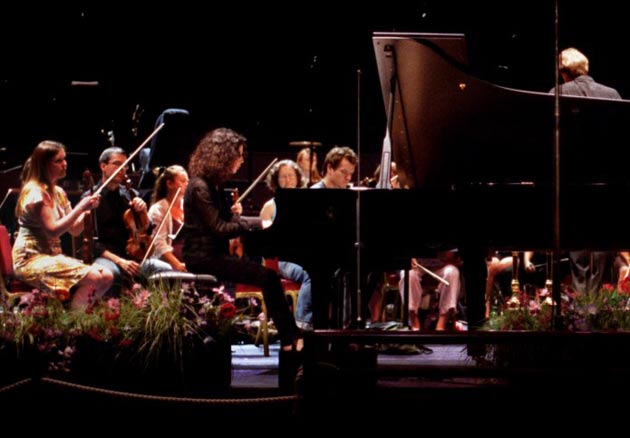Proms 32, 33 and 36, Royal Albert Hall, London
Two for the price of one – it's the credit crunch Proms

From the Arpicimbalo to the Orphica, the Giraffe to the Grand, the piano has enjoyed a remarkable history. In 1910, some 75,000 were produced in Britain alone, to be placed in parlours as a symbol of aspiration, education and industry. Handmade and mass-produced; accessorised with Janissary stops and candelabras; "prepared" with thumbtacks, paper or nuts and bolts; dressed with potted plants and family photographs, or struck by bullets in Wild West saloons; played by two, four or even six hands and grouped into twos, fours and many, many more by Czerny and Gottschalk, this instrument's memoirs would run to several volumes.
Those hoping for a reconstruction of Gottschalk's 1852 Madrid extravaganza for 10 pianos will have felt a little short-changed by Multiple Pianos Day (Proms 32 and 33). Four was the maximum number of keyboards to be tessellated on stage in two credit-crunchy, back-of-an-envelope concerts of private jokes, public provocations, lollipops and laments from a total of 12 pianists. Though exquisitely played by the Britten Sinfonia under Lodovic Morlot, Henri Rabaud's anodyne orchestration of Fauré's four-handed Dolly Suite was a perverse choice for the opening number, and Katia and Marielle Labeque's performance of Mozart's Concerto in E flat was stylistically unsteady, as though both pianists were attempting to impose a proto-Romantic sensibility on this profoundly Classical work.
Anna Meredith's Left Light saw some rather banal, low-high, soft-loud ideas for two lightly prepared pianos, muddied by hyperactive orchestration. Only in Lutoslawski's Variations on a Theme of Paganini did the Labèque sisters bring some zest and vigour to a tepid programme. Despite the hypnotic gleam of "Aquarium", I can understand why Saint-Saëns did not want The Carnival of the Animals to be published in his lifetime. Written for the amusement of his friends, the deliberately dreadful scales of "Pianists" are a forerunner of Igudesman and Joo's "Rachmaninov had Big Hands" cabaret routine; it is not a concert piece, though Lidija and Sanja Bizjak's brilliant sound, precise fingerwork, and excellent listening skills shone through.
Would Ballet Mécanique have been too difficult for the children at the afternoon family performance? They'd have loved the doorbells. Under Edward Gardner, London Sinfonietta's percussionists and pianists Rolf Hind, John Constable, Ashley Wass and Tom Poster motored through George Antheil's Cubist score like manic cartoon characters. In Grand Pianola Music, Synergy Vocals sang like birds on a wire, while Constable and Hind did the work of symphonic strings, and choirs of brass tossed Adams's bright, empty beach-ball of a melody back and forth. Philip Moore, Simon Crawford-Phillips, Colin Currie and Sam Walton teased apart the bleak, silvered layers of Bartok's Sonata for Two Pianos and Percussion, sidling into uncomfortable, evocative, restless silence and frigid fugato. These were the high spots, for Les Noces, though wonderfully sung by Tatiana Monogarova, soon became more redolent of a drunken wedding party than Stravinsky could have imagined.
Sometimes a simple rhythmic device is all it takes to lend cohesion to scattergun programming. In The Sixteen's Handel celebration (Prom 36) it was the dotted quavers. Much like the first concert of Multiple Pianos Day, this was littered with lollipops and closed with a work familiar from film and television. Everyone thinks they know Zadok the Priest, but it is so often edited to exclude those moments when Handel picks up the instrumental prelude like a cube, turning it about to examine each side, that it remains quite shocking in its narrative and harmonic boldness. Finely balanced by Harry Christophers, with the oboes softly foregrounded and the harpsichord offering a gentle, free-form commentary, this was a stunning conclusion to a performance in which forgotten details were cherished. I'm as thrilled as anyone by the blaze of natural brass and kettledrums but the lilting femininity of the central movements of My heart is Inditing was really special. Special too was the string playing in the 1707 motet, Salve Regina, sung by Carolyn Sampson with one foot in the convent and the other in the bordello.
The Proms (0845 401 5040), to 12 Sep
Join our commenting forum
Join thought-provoking conversations, follow other Independent readers and see their replies
Comments
Bookmark popover
Removed from bookmarks